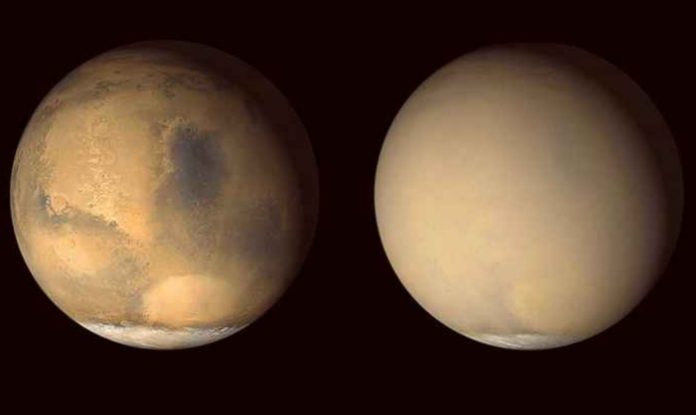A mismatch in the amount of solar energy that the planet Mars absorbs and releases may be to blame for its recurring dust storms, according to a team of experts.
University of Houston researchers Liming Li, associate professor of physics, Xun Jiang, professor of atmospheric science, and Ellen Creecy, doctoral student and lead author of an article to be published this week in the PNAS, have documented Mars’ extreme imbalance in its energy budget.
“One of our most interesting findings is that the energy excess – more energy being absorbed than emitted – could be one of the generating mechanisms of Mars’ dust storms. Understanding how this works on Mars might provide clues about the roles Earth’s energy budget takes in the development of severe storms, including hurricanes, on our own planet,” said Creecy.
Mars’ thin atmosphere and irregular orbit make it particularly vulnerable to temperature variations. When it swings closest to the sun in its perihelion seasons (spring and summer for Mars’ southern hemisphere), it absorbs massive amounts of solar radiation, which is also when its dust storms appear. Mars absorbs less solar energy as it moves further away from the sun in its orbit. This phenomena also occurs on Earth, but the researchers discovered that it is more intense on Mars.
Energy imbalances on Earth may be monitored by season and year, and they play an important influence in global warming and climate change. Creecy and her colleagues are investigating if energy imbalance exists on Mars on longer time scales, and if so, what the implications might be for the planet’s climate change.
“Mars is not a planet that has any kind of real energy storage mechanisms, like we have on Earth. Our large oceans, for example, help to equilibrate the climate system,” Creecy added.
However, there are clues on Mars that oceans, lakes, and rivers were once plentiful. So, what went wrong? Why or when the planet dried into a scorching, dusty globe with an excess of iron oxide — rust, to be precise – whose tawny color inspired observers centuries ago to call it the Red Planet remains a mystery.
“Mars had oceans and lakes in the past, but it later experienced global warming and climate change. Somehow, Mars lost its oceans and lakes,” said li.
“We know that climate change is happening on Earth now. So what do the lessons of Mars’ experience hold for the future of Earth?.”
Creecy and her colleagues came to their conclusions after comparing four years of data (Martian years are about comparable to eight Earth years) on Mars’ orbits and temperatures to NASA mission data.
For people who are interested in planets, they say that most of the information can be found for free on NASA’s Planetary Data Systems website. However, some information is only available to researchers. They also worked with NASA scientists, including those who have worked on previous missions such as the Mars Global Surveyor and two rovers, Curiosity and Insight, which are currently active on Mars.
“If we open our eyes to a wide field, Earth is just one planet. With just one point, we never can see a complete picture. We have to look at all points, all planets, to get a complete picture of the evolution of our own Earth. There are many things we can learn from the other planets,” Li added.
“By studying the history of Mars we gain a lot. What is climate change? What’s the future phase for our planet? What’s the evolution of Earth? So many things we can learn from other planets.”
Image Credit: Getty
You were reading: Scientists Have Finally Figured Out What Causes Dust Storms on Mars
